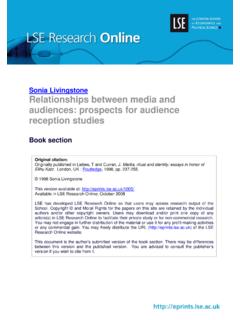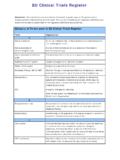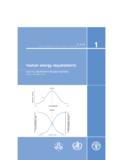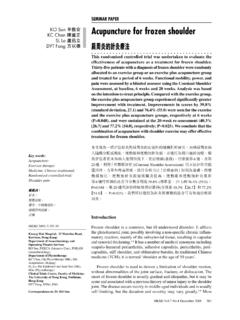Transcription of Aimee Spector, Georgina Charlesworth, Michael King, Susan ...
1 Aimee Spector, Georgina Charlesworth, Michael King, Susan Sadek, Louise Marston, Amritpal Rehill, Juanita Hoe, Afifa Qazi, Martin Knapp, Martin Orrell Cognitive Behavioural therapy (CBT) for anxiety in dementia: a pilot randomised controlled trial Article (Accepted version) (Refereed) Original citation: Spector, Aimee , Charlesworth, Georgina , King, Michael , Sadek, Susan , Marston, Louise, Rehill, Amritpal, Hoe, Juanita, Qazi, Afifa, Knapp, Martin and Orell, Martin (2015) Cognitive Behavioural therapy (CBT) for anxiety in dementia: a pilot randomised controlled trial. British Journal of Psychiatry. pp. 1-27. ISSN 0007-1250 (In Press) 2014 The Royal College of Psychiatrists This version available at: Available in LSE Research Online: December 2014 LSE has developed LSE Research Online so that users may access research output of the School.
2 Copyright and Moral Rights for the papers on this site are retained by the individual authors and/or other copyright owners. Users may download and/or print one copy of any article(s) in LSE Research Online to facilitate their private study or for non-commercial research. You may not engage in further distribution of the material or use it for any profit-making activities or any commercial gain. You may freely distribute the URL ( ) of the LSE Research Online website. This document is the author s final accepted version of the journal article. There may be differences between this version and the published version. You are advised to consult the publisher s version if you wish to cite from it.
3 1 Cognitive Behavioural therapy (CBT) for anxiety in dementia: A pilot randomised controlled trial Running head: CBT for anxiety in Dementia: An RCT * Aimee Spector, Research Department of Clinical, Educational and Health Psychology, University College London, London, United Kingdom. Georgina Charlesworth, Research Department of Clinical, Educational and Health Psychology, University College London, London, United Kingdom. Michael King, Division of Psychiatry, University College London, London, United Kingdom. Miles Lattimer, North East London NHS Foundation Trust, London, United Kingdom. Susan Sadek, Department of Clinical Psychology, University of East Anglia, Norwich, England. Louise Marston, Department of Primary Care and Population Health, University College London, London, United Kingdom.
4 Amritpal Rehill, Personal Social Services Research Unit, London School of Economics and Political Science, London, United Kingdom. Juanita Hoe, Department of Mental Health Sciences, University College London, London, United Kingdom. Afifa Qazi, North East London NHS Foundation Trust, London, United Kingdom. Martin Knapp, Personal Social Services Research Unit, London School of Economics and Political Science, London, United Kingdom. Martin Orrell, Division of Psychiatry, University College London, London, United Kingdom. *=Corresponding author 2 Abstract Background Anxiety is common and problematic in dementia, yet there lacks effective treatments. Aims To develop a CBT manual for anxiety in dementia, and determine its feasibility through an RCT.
5 Methods A ten session CBT manual was developed following literature search, expert consultation, consensus conference and field testing. Fifty participants with dementia and anxiety (and their carer) were randomly allocated to CBT plus treatment as usual (TAU) (n=25) or TAU (n=25). Outcome and cost measures were administered at baseline, 15 weeks and 6 months. Results At 15 weeks, there was an adjusted difference in anxiety (using the RAID) of ( ; 95% CI , ) for CBT compared to TAU, which fell short of statistical significance. There were significant improvements in depression at 15 weeks after adjustment ( ; 95% CI - , ). Improvements remained significant at six months. CBT was cost neutral. Conclusions CBT was feasible (in terms of recruitment, acceptability and attrition) and effective.
6 A fully powered RCT is now required. Declaration of Interest None Introduction Anxiety in dementia is common, with prevalence estimated from 5-21% for anxiety disorders and up to 71% for anxiety symptoms [1]. Anxiety may physically present as motor restlessness, agitation, day/night disturbance and/or aggression, and as the dementia progresses, often results in exacerbated symptoms due to increased dependency and behavioural problems [2,3]. Anxiety in dementia often receives little attention [1]. People may get treated with psychotropic medication (such as antidepressants), even though there is little if any evidence of benefit and use of antipsychotics presents serious risks [4]. Cognitive behaviour therapy (CBT) [5] is a 3 collaborative psychological approach that addresses the interaction between people s thoughts, feelings and behaviour.
7 There is robust evidence that CBT is an effective first-line strategy for anxiety in older people without dementia [6]. The UK National Health Service widely endorses CBT through its Improving Access to Psychological Therapies (IAPT) programme [7], which supports primary care trusts in implementing CBT for depression and anxiety. There is evidence that people with dementia can learn and develop skills [8], which suggests that CBT could be used for people with dementia, as it has been in other impaired populations including learning disabilities [9]. There is some evidence for the feasibility of CBT for anxiety and depression in dementia, primarily through case studies and two small RCTs in the US [ 2, 10, 11, 12].
8 They all concluded that larger trials are needed. This study had two phases, which correspond to phase I and II of the MRC s guidelines for developing a complex intervention and assessing feasibility [13]. They were: (1) To develop a CBT intervention manual. (2) To assess the feasibility of the intervention through a single-blind, pilot RCT of CBT plus treatment as usual (TAU) versus TAU for people with dementia (supported by their carers). This included an assessment of acceptability, compliance, recruitment, retention and costs. Method Ethics statement Ethical approval was obtained through the East London 3 Research Ethics Committee (reference number 10/H0701/124). Stage I: Manual development The manual was developed in several stages, described previously [14].
9 Its development involved systematic literature review, expert review, a consensus conference with 30 people and field-testing with three people with dementia. The version used in this trial involved a three-phase formulation-driven therapy based on Beck and Clark s [5] cognitive model of anxiety, whereby an individualised (person-centred) formulation is collaboratively reached to guide progress. Phase 1 involves building a collaborative relationship, psychoeducation about CBT and the excess disability caused by anxiety in dementia, self-monitoring, developing an 4 individualised formulation and identifying goals. During this first phase, the level of carer involvement is also established. The carer s role is to support the person with dementia in implementing strategies, for example applying what has been discussed during sessions in everyday life.
10 Their involvement could range from very little ( attending brief parts of some sessions) to being present at all times. Phase 2 involves the application of change processes, which the therapist can adapt according to the needs and strengths of the individual. These include identifying and practicing strategies for feeling safe, identifying and challenging unhelpful cognitions, addressing realistic negative automatic thoughts , calming thoughts (on cue cards) and behavioural experiments. Phase 2 also had optional modules for considering longstanding unhelpful rules for living and for addressing interpersonal difficulties between the carer and person with dementia. Phase 3 works on ending the therapy and developing a blueprint for the future.















